HomeReviewsEnotria: The Last Song
Enotria: The Last Song review: a straightforward, sunny SoulslikeBugs aside, this is a refreshing AA monster-basher
Bugs aside, this is a refreshing AA monster-basher
Image credit:Rock Paper Shotgun/Jyamma Games
Image credit:Rock Paper Shotgun/Jyamma Games
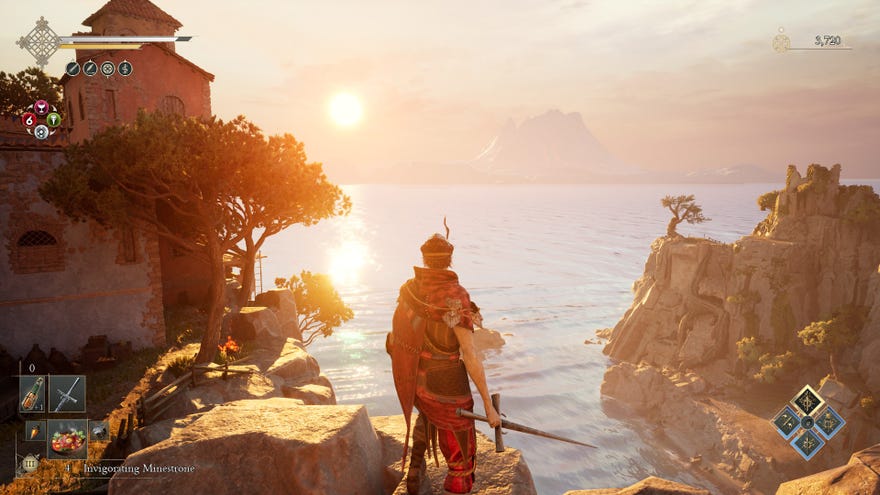
When playing a newSoulslike, there’s an element of translation involved while you figure out the language of the game. What are the upgrade materials called? What’s the equivalent of poison? What are experience points and checkpoints called, although you’re going to call them souls and bonfires anyway? I’ve done this many, many times, but on this occasion there was a surprising twist, one which would have notorious pearl-clutching racist HP Lovecraft spinning in his grave.Enotria: The Last Song’s arcane Soulslike language is actually just Italian.
Image credit:Rock Paper Shotgun/Jyamma Games
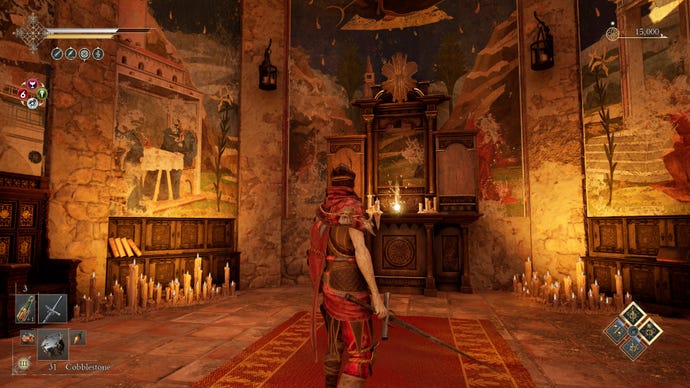
It’s a real shame, because Enotria has a lot to recommend it. It’s genuinely gorgeous and the setting is inspired, drawing on a variety of Italian cultural touchstones, from Ancient Rome to the canals of Venice. The environments immediately set it apart from most of its genre mates, eschewing the dark and dreary for the bright and cheery. The starting zone of Quinta moves from lush, golden wheatfields to a town locked in perpetual carnival, while elsewhere we see sun-bleached Mediterranean cliffs and soaring Roman columns. Even the more shadowy zones are colourful in their own way, with the nighttime cityscape of Litumnia rendered in darker shades that are still rich and evocative.
Image credit:Rock Paper Shotgun/Jyamma Games
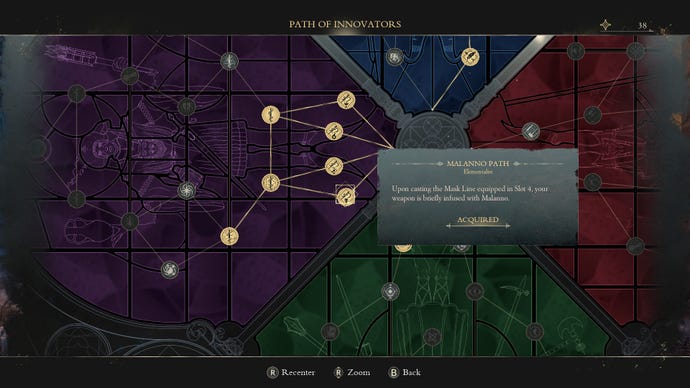
I went with a sort of sword mage build, buffing my weapons with elemental enchantments and choosing supporting skills that increased my power whenever one of my enchantments was running, or when an enemy was afflicted with a status effect. This proved to be a good decision, as it meant constantly tweaking my loadout to best deal with the selection of enemies in a given area, or tinkering to find the best build for beating a boss. Thankfully you can have three different loadouts at a time and can switch between them on the fly.
Image credit:Rock Paper Shotgun/Jyamma Games
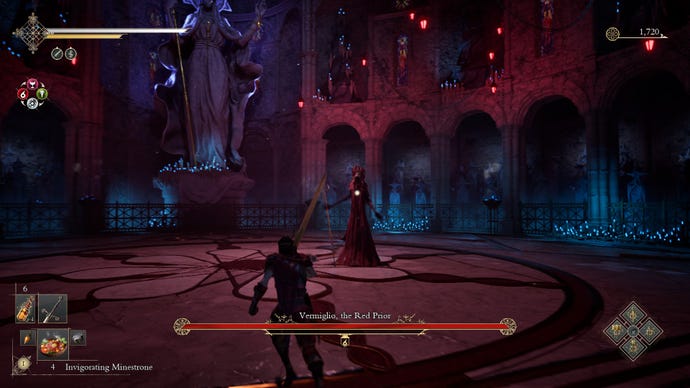
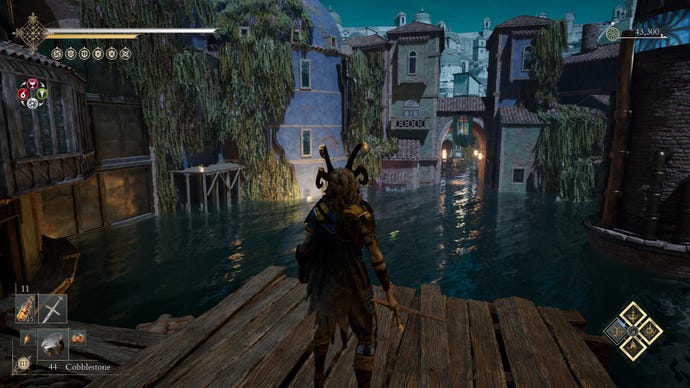
Image credit:Rock Paper Shotgun/Jyamma Games
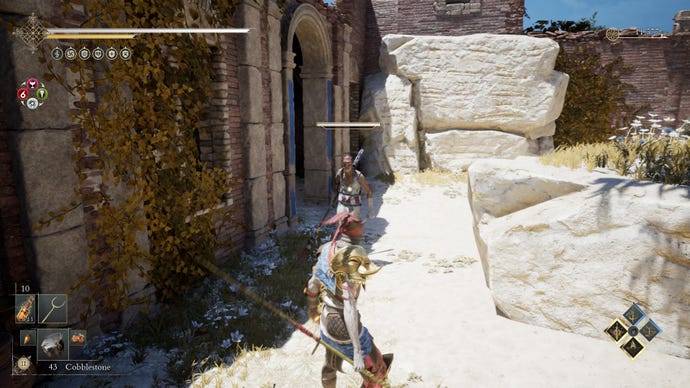
Enotria’s status effects are worth calling out, because of an elegant implementation that adds a layer of strategy beyond typical “water beats fire” elemental interactions. There are only four elements in the game, each with a corresponding status that has both a positive and negative effect. Vis, which as far as I can tell is supernatural drunkenness, increases your damage output and stamina recharge rate, but lowers your defences. Gratia, on the other hand, grants healing over time, but build up too much and it explodes, tearing off a big chunk of health.
That said, a more straightforward build would avoid running into Enotria’s aforementioned poor explanations too much. Spells, or “lines”, all charge up at different rates. There’s no mana equivalent, you just wail on enemies until one of the spells in your four slots accumulates enough juice to be cast. Each spell description specifies how quickly it charges, but in Italian (I wasn’t joking about it being helpful! I muddled through thanks to half-remembered childhood music lessons, but if you don’t know yourprestofrom yourallegro, you’re out of luck.
Image credit:Rock Paper Shotgun/Jyamma Games
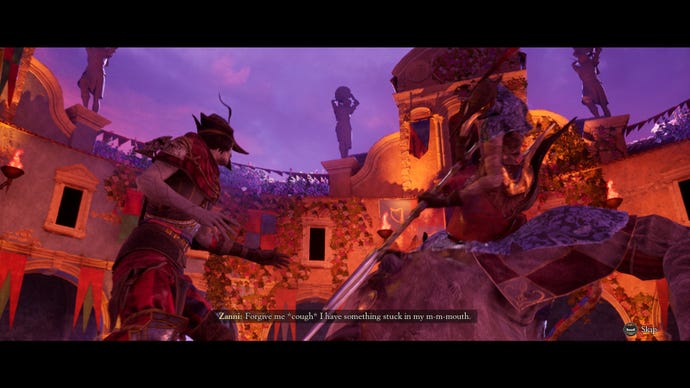
This poor communication extends to other areas too. After defeating the big boss at the end of each zone, you’re briefly shown where to go next. Hopefully you recognise the location and exactly where it is, otherwise you’ll be spending a considerable amount of time running around trying to find it. There’s no map, which generally isn’t a problem, but when you’re trying to find a specific door that has now unlocked, it would be really helpful to have some kind of reference.
It’s also quite buggy. In the 25 hours it took me to get through the game, I encountered a variety of issues including NPC conversations getting stuck and controls locking up, along with a couple of crashes. Performance issues cropped up, with occasional stutters and persistent screen tearing that I could just not get rid of. Worst of all was the final boss just freezing up on one attempt, allowing me to just beat on him and skip his final phase entirely. Little bit anticlimactic, that. Jyamma is aware of many of the issues and already working on fixes, but it strikes me as a bit off to move the release date of a game forward (it was brought forward while I was working on this review, so some of my time was spent with the launch build) when you’re still fixing problems.
These issues aside, I had a great time with Enotria. Coming off of playing hundreds of hours of the sprawlingElden Ring, particularly the DLC, it was refreshing to play a Soulslike with a more manageable length and back to basics approach. The unusual setting and beautiful, appropriately shortcut-stuffed environments were a delight to adventure through. While you have to actively embrace the intricacies of the systems on offer, they’re smart, inventive, and I hope to see some of the ideas built on in the future. Enotria is the epitome of the AA game, with all the good and bad that comes with it.